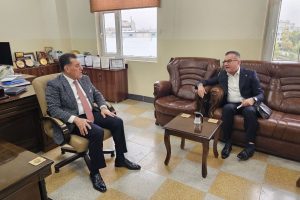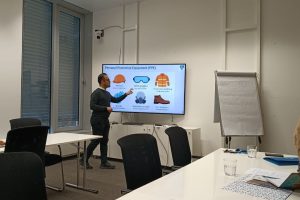Success of the 5th International Conference on Architectural and Civil Engineering at Cihan University-Erbil in Collaboration with Universiti Putra Malaysia
The 5th International Conference on Architectural and Civil Engineering, organized by Cihan University-Erbil in collaboration with Universiti Putra Malaysia, was successfully held from February 26 to 27, 2025. This event saw a massive attendance of academics, scholars, and industry professionals.
The conference included research papers and presentations on the latest trends in architectural and civil engineering, as well as panel discussions, interactive workshops, and an exhibition of engineering innovations. It was an excellent opportunity for participants to share their experiences and knowledge.
The conference sought to promote international academic and research cooperation, encourage better innovation and creativity in all unrivaled industries, and achieve sustainable solutions to problems facing the people. The conference, which was a platform for participants to exchange ideas and discuss challenges, featured discussion and dialogue sessions, interactive workshops designed to develop the skills of participants in the fields of sustainable design, artificial intelligence, and engineering project management, an exhibition of engineering innovations highlighting the latest technologies and innovative engineering projects, as well as honoring distinguished researchers in recognition of their contributions to advancing scientific research.
At the end of the conference, Dr. Ribwar Ibrahim presented various findings and recommendations to define a sustainable and innovative future for the engineering sector, which came up on the outcome of the conference. These recommendations were built on a prospective vision that considers the existing and future challenges, and were grouped around four main interconnected axes.
1) Preserve the Content Revolutions (Green & Resilient) — The axis of sustainable and flexible design, which highlights the urgent need for environmentally friendly building construction practices, starting with the availability of sustainable building materials and recyclable materials, to green, energy-efficient, water-efficient buildings capable of adapting to climate change and natural disasters, the integration of green spaces within projects to promote biodiversity and improve air quality.
(2) Axis of technological integration and innovation focuses on the roles of modern technologies in facilitating quality and efficiency in execution of small, medium and massive engineering projects as well as stimulating innovations in the development of sustainable engineering solutions and renewable energy technologies; smart infrastructure; and 3D printing technologies in construction.
Secondly, integration and innovation in the technology axis, which included entering into the advanced technology battle, BIM, artificial intelligence as tools for more effective and better engineering, developing new engineering solutions such as renewable energy technologies, smart infrastructure, construction by 3D printing, and advanced engineering technology investment.
Axis of enhancing education and research is to qualify distinguished engineers who are capable of applying principles of sustainability and innovation by updating the syllabus of engineering faculties to include materials on sustainability and modern technology, improving cooperation between universities and industrial institutions in research work, providing grants and support for researchers in the areas of sustainable engineering, the establishment of specialized research centers, and holding conferences, seminars and workshops to exchange knowledge and experience.
The fourth axis is for professional development and capacity building. It aims to develop the capabilities of engineers working in the sector and encourage the application of sustainable practices in projects by providing continuous training programs on the latest technologies and practices, promoting the adoption of professional certifications in sustainability and green engineering fields, developing standards and guidelines on practices, establishing electronic platforms for exchanging knowledge and experiences between engineers, and inspiring companies to adopt sustainable policies and practices.
The conference called upon all parties concerned including governments, academic institutions, engineering companies, engineers and the civil society to work in close cooperation to implement these recommendations, insisting that cooperation would be in the best interests of building a better future for the engineering sector, future contributing to the achievement of sustainable development and prosperity for all.
At the end of the conference, Prof. Dr. Amjad Saber Al-Delwai, the President of Cihan University-Erbil, delivered a landmark speech. He started by gratefully and sincerely thanking all researchers and academia, who came from different areas around the globe, played an active role during the conference sessions and discussions, and presented valuable findings to the sessions. The Sharjah Institute for Advanced Learning Research President explained that the high-profile attendance affirms the increasing importance of the conference, which plays a key role in advancing scientific research and exchanging experiences in various branches of engineering.
Moving to the most important part of this talk, Professor Dr. Amjad invited all those responsible for government institutions and officials from different sectors to put the outputs and recommendations of the conference into action on the ground. Dr. Shaath affirmed that such recommendations, which represent the outcome of extensive research and thorough reviews, are replete with innovative solutions for the challenges facing our societies and building a better and more sustainable future.
Professor Dr. Amjad also mentioned that the research papers presented during the conference were of high-quality and addressed sensitive issues to comprehensive development and quality of life. He explained that this research is a roadmap presented to governmental institutions to provide them with practical visions and recommendations that can be implemented to achieve the development goals desired.
Finally, Professor Dr. Amjad hoped that the conference would achieve more active participation and fruitful interaction in the coming sessions, and that it would also continue its pioneering role in the service of scientific research and the development of cooperation between researchers, academics and decision-makers, serving the societies in which we live and participating in building a better world.









